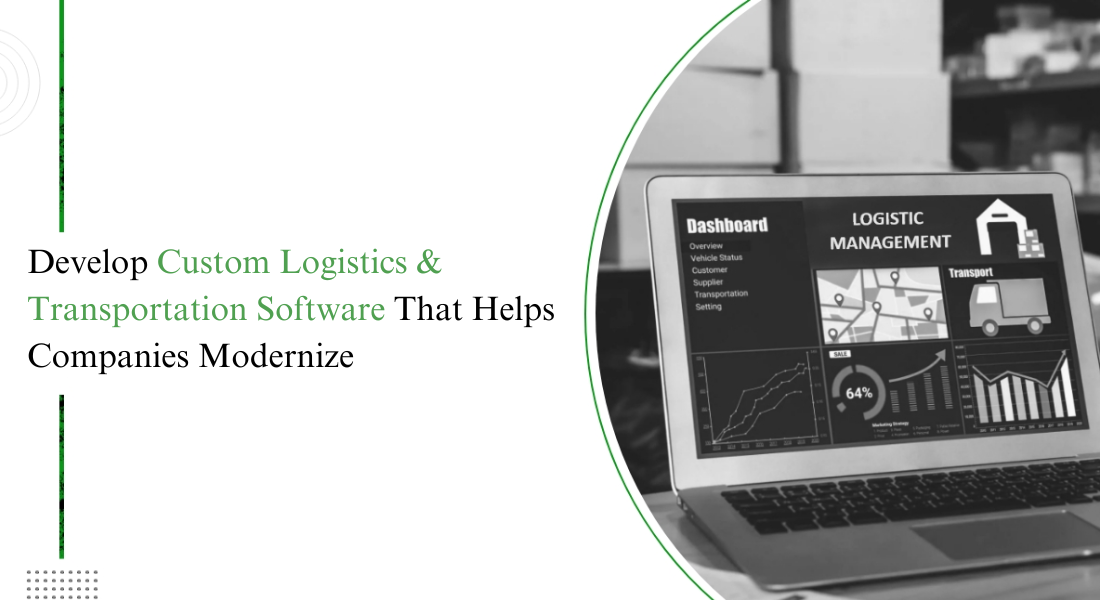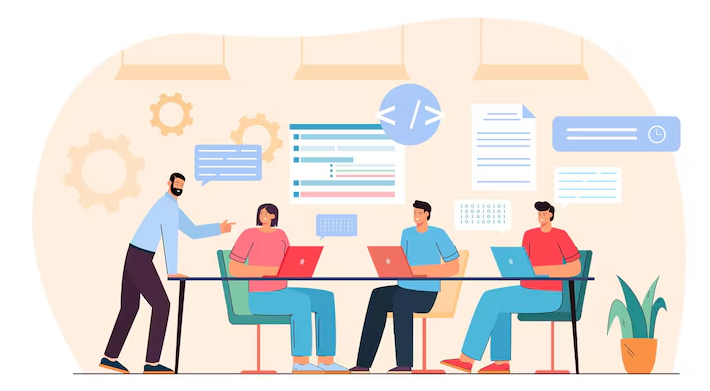In the present, all businesses seek out practical and efficient ways to improve customer expectations and take advantage of technology-driven competitiveness. With this in mind, the question is how shipping and transport companies can avoid being left behind. Like every other industry, the companies in this sector are using new technologies to tackle their primary challenges and improve their operations to yield more.
In this regard, Custom Transportation Logistics Software is the most effective way to compete within the marketplace with changing customers' expectations and rapid technological adjustments. Globally, the market for logistics is expected to grow to USD 14.08 trillion in 2028. Simply put, this is the most efficient way to automate complicated logistics and transportation procedures and allow businesses to improve their efficiency in freight operations.
Suppose you plan to create logistic software or upgrade your existing software. In that case, studying and finding essential information is crucial. Find out more about developing logistics and transport software in this article.
What Is Logistics Software Development?
Logistics and transportation software development involves creating custom applications specifically designed to improve and simplify logistics and supply chain procedures. This involves creating specialized software that aids organizations in managing tasks related to logistics, including transportation and shipping, Warehouse Management Solutions, inventory, and order tracking. Logistics Management Software (LMS) improves the efficiency of logistics processes by optimizing the production process. The software allows users to access crucial details and helps organizations efficiently manage processes.
Logistics is an intricate and ever-changing industry that demands continuous adaptation and improvement. Suppose you're a freight forwarder, a transporter, a warehouse manager, or a retailer. In that case, you must handle multiple operations and processes, including transport, inventory, delivery of goods, tracking and billing, and much more.
Benefits Of Custom Logistics And Transportation Software Development
The development of custom logistics software offers many benefits over standard or off-the-shelf software solutions. Some of them are:
Improved Functionality And Integration
Customized logistics software provides all the functions and features you need to run your business efficiently and effectively. Additionally, you can integrate it with your current systems and platforms, such as ERP Accounting, CRM, or even e-commerce, to provide one seamless, unified system.
Transparency And Visibility Improved
Custom logistics software provides the most current and precise details and information about your supply chain operations, such as the status of your inventory, shipping levels, deliveries, times of delivery, costs, and much more. You can also provide this data to your clients, partners, and other parties to increase communication and cooperation.
More Customer Satisfaction And More Loyalty
They will help you provide quicker, safer, and more secure solutions to your clients, including online scheduling, tracking, feedback notifications, support, and notifications. This will improve customer service, satisfaction, and loyalty. It will also increase customers to refer you to others and increase returning business.
Improved Efficiency And Profit
Customized logistics software can simplify and automate your processes and jobs. For example, you can easily manage orders with the help of Order Management Solutions, routing, tracking, invoicing, and reporting. It can help reduce the number of human mistakes, time and effort, and productivity and efficiency.
Flexibility And Greater Scalability
Customized logistics software can adapt to changing needs, adding new functions, features, and integrations and expanding into new regions, markets, or segments. You can also modify or upgrade your software whenever you want and not rely on the provider or vendor.
Faster Delivery
Routing optimization, real-time tracking, and automated order processing can streamline the fulfillment process. This speeds up delivery, improves customer satisfaction, and helps you complete deadlines more efficiently.
Risks To Security And Compliance Are Lessened
They may assist you in complying with industry rules and standards, such as taxation and customs, as well as safety and environmental concerns. Implementing more advanced security measures also helps safeguard your information and transactions against unauthorized access or data breaches.
Steps To Develop Logistics And Transportation Software
It is essential to be ready to overhaul the logistics and transport process completely. Creating a customized software solution can enhance productivity, streamline procedures, and boost your business's overall performance. Now, let us review the basic steps to developing logistic business software.
Analyze Your Needs
With the help of Logistics Consulting software development experts, outline your company's goals and requirements appropriately. Then, review the exact specifications and features your logistics system might need.
Map Your Budget And Timeline
Your strategy outlines your company's cash and time requirements and staff requirements. Conducting a thorough market study is essential to understanding internal development processes.
Hire The Right People
Finding people with the right skills for the project is essential, as the company's future success depends on this. It is important to look for people with prior experience in this industry to ensure the proper experience for your software development.
Develop a Prototype
The experts you hire will help develop an initial version of your transportation management software, which highlights the main features and layout of the user interface. The prototype is a visual representation of the software that allows users to make suggestions and necessary changes before the program develops fully.
Confirm And Execute The Final Development
The process involves thorough testing to verify the software's reliability and effectiveness. After verification, it is set up and then implemented for use in logistics processes.
Test The Application And Debug It
The following step is crucial: ensuring that the program functions properly and identifying any flaws or issues. Developers find and rectify defects or issues using a variety of tests, including testing systems and units. The process ensures that the software complies with the intended criteria and performs at its peak.
Launch And Collect Feedback
The ultimate step is initiating the program. During this stage, it is made available to all users to allow them to implement and utilize the software to manage their operations. Gathering user feedback at this stage is essential for understanding the user's experience and identifying areas of improvement. User feedback can help improve and adapt the program to satisfy users' needs better.
Cost To Develop Logistics And Transportation Software
The cost to develop logistics software depends on several factors. Generally, a standard solution's minimum feasible product (MVP) is about $20,000. But, a variety of factors influence the cost of the solution:
As mentioned, on-premises deployment costs more. However, choosing cloud-based technology will save you additional hardware costs and ongoing maintenance.
There are many options to incorporate in your web application and mobile apps. It's natural to think that the less complicated your plan will be, the less expensive it will cost; however, that's not the case. Including all of the essential functions while developing the logistics software is more affordable because including features in existing applications can be time-consuming and costly. Additionally, by using complete software, you can improve your operations immediately. At the same time, cut operating costs and deliver better services as soon as possible.
Hiring a group of programmers requires much effort, time, and investment. Acquiring and licensing a logistics system is economical but not as efficient. In the past, prepackaged solutions might not include the required modifications or may not be able to incorporate with the software that you require.
Conclusion
Logistics is a highly competitive field in which businesses must meet their goals and perform better than other companies in the industry. Various methods can cut down on logistics expenses for both large and small firms. However, the best one is developing custom logistics software. Good logistics software makes the process much simpler. It can take over a large amount of manual labor with a small cost, leading to significant improvements in productivity.
At first sight, creating a custom logistics system might seem daunting; however, it's well worth the effort. With the best team of developers, a modern mobile and web-based platform that streamlines your workflow and saves your company cash is within your reach.






